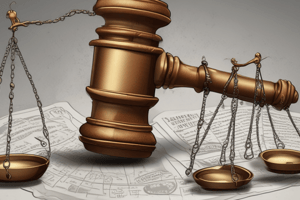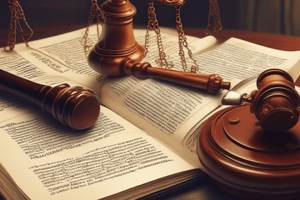Podcast
Questions and Answers
What must occur for a person to be liable as an accessory in a crime?
What must occur for a person to be liable as an accessory in a crime?
- The principal offense must be committed. (correct)
- The principal offender must not be convicted.
- The accessory must be present during the crime.
- The accessory must have a separate motive.
Which of the following is a requirement for secondary liability?
Which of the following is a requirement for secondary liability?
- The principal offender's conduct must be lawful.
- D must be present at the scene of the crime.
- D's assistance or encouragement must be combined with mens rea. (correct)
- The principal offense can be an inchoate offense only.
Which of the following statements about inchoate offenses is true?
Which of the following statements about inchoate offenses is true?
- Inchoate offenses are always linked to completed crimes.
- D's liability doesn't depend on the principal offender's actions. (correct)
- D can only be liable if the principal offense occurs.
- D must have physical presence during the attempted crime.
What is the nature of secondary liability in relation to principal offenses?
What is the nature of secondary liability in relation to principal offenses?
For which type of behavior might D be liable even if the principal offense does not occur?
For which type of behavior might D be liable even if the principal offense does not occur?
Flashcards are hidden until you start studying
Study Notes
Introduction to Parties to Crime
- A person who directly commits a crime is the principal offender (P).
- An accessory or secondary party (D) can also be liable for the crime.
- Common law and statutory rules determine accessory liability, except in cases where it's explicitly excluded.
- D's liability arises if they aided, abetted, counselled, or procured (assisted or encouraged) P.
- The principal offense must be committed for D to be liable.
- D can be liable for an inchoate offense (e.g., aiding an offense that hasn't happened).
- D's liability for inchoate offenses doesn't rely on whether P committed the offense.
- Secondary liability is considered derived from the principal offense.
- To determine D's liability, first, determine if the principal offense occurred, then whether D fulfilled the aiding and abetting requirements.
- It's not necessary to verify the elements of the principal offense. Instead, determine if D's conduct constituted assistance or encouragement with the required mental element (mens rea).
- Some offenses are based on assisting or encouraging an offense, which becomes the offense itself.
- D can be liable for statutory offenses even if the principal offense doesn't occur.
- Offenses of "being knowingly concerned in" a type of behavior (e.g., drug importation) result in individual liability even if there's misconduct by another.
- Current common law secondary liability is complex and problematic.
- Reform is needed to make it clearer, more principled, and fairer.
Studying That Suits You
Use AI to generate personalized quizzes and flashcards to suit your learning preferences.



